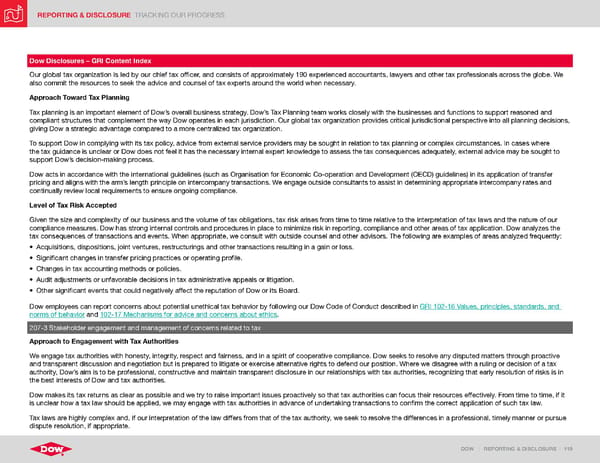REPORTING & DISCLOSURE TRACKING OUR PROGRESS DOW | REPORTING & DISCLOSURE | 119 Dow Disclosures – GRI Content Index Our global tax organization is led by our chief tax officer, and consists of approximately 190 experienced accountants, lawyers and other tax professionals across the globe. We also commit the resources to seek the advice and counsel of tax experts around the world when necessary. Approach Toward Tax Planning Tax planning is an important element of Dow’s overall business strategy. Dow’s Tax Planning team works closely with the businesses and functions to support reasoned and compliant structures that complement the way Dow operates in each jurisdiction. Our global tax organization provides critical jurisdictional perspective into all planning decisions, giving Dow a strategic advantage compared to a more centralized tax organization. To support Dow in complying with its tax policy, advice from external service providers may be sought in relation to tax planning or complex circumstances. In cases where the tax guidance is unclear or Dow does not feel it has the necessary internal expert knowledge to assess the tax consequences adequately, external advice may be sought to support Dow’s decision-making process. Dow acts in accordance with the international guidelines (such as Organisation for Economic Co-operation and Development (OECD) guidelines) in its application of transfer pricing and aligns with the arm’s length principle on intercompany transactions. We engage outside consultants to assist in determining appropriate intercompany rates and continually review local requirements to ensure ongoing compliance. Level of Tax Risk Accepted Given the size and complexity of our business and the volume of tax obligations, tax risk arises from time to time relative to the interpretation of tax laws and the nature of our compliance measures. Dow has strong internal controls and procedures in place to minimize risk in reporting, compliance and other areas of tax application. Dow analyzes the tax consequences of transactions and events. When appropriate, we consult with outside counsel and other advisors. The following are examples of areas analyzed frequently: • Acquisitions, dispositions, joint ventures, restructurings and other transactions resulting in a gain or loss. • Significant changes in transfer pricing practices or operating profile. • Changes in tax accounting methods or policies. • Audit adjustments or unfavorable decisions in tax administrative appeals or litigation. • Other significant events that could negatively affect the reputation of Dow or its Board. Dow employees can report concerns about potential unethical tax behavior by following our Dow Code of Conduct described in GRI 102-16 Values, principles, standards, and norms of behavior and 102-17 Mechanisms for advice and concerns about ethics . 207-3 Stakeholder engagement and management of concerns related to tax Approach to Engagement with Tax Authorities We engage tax authorities with honesty, integrity, respect and fairness, and in a spirit of cooperative compliance. Dow seeks to resolve any disputed matters through proactive and transparent discussion and negotiation but is prepared to litigate or exercise alternative rights to defend our position. Where we disagree with a ruling or decision of a tax authority, Dow’s aim is to be professional, constructive and maintain transparent disclosure in our relationships with tax authorities, recognizing that early resolution of risks is in the best interests of Dow and tax authorities. Dow makes its tax returns as clear as possible and we try to raise important issues proactively so that tax authorities can focus their resources effectively. From time to time, if it is unclear how a tax law should be applied, we may engage with tax authorities in advance of undertaking transactions to confirm the correct application of such tax law. Tax laws are highly complex and, if our interpretation of the law differs from that of the tax authority, we seek to resolve the differences in a professional, timely manner or pursue dispute resolution, if appropriate.
 ESG Report | Dow Page 118 Page 120
ESG Report | Dow Page 118 Page 120